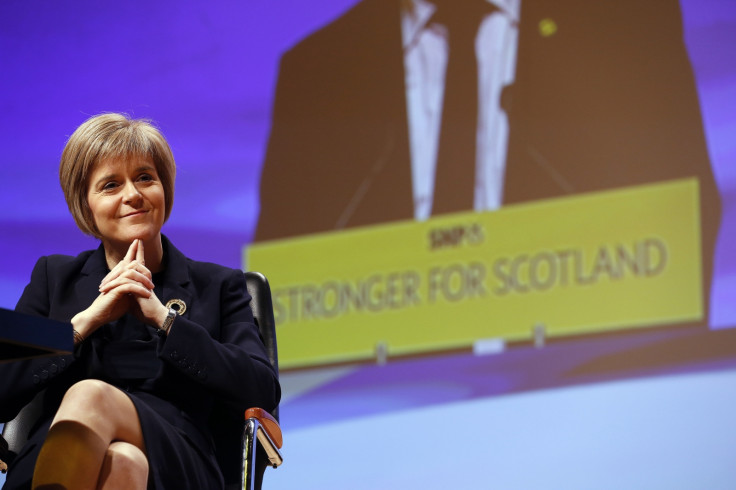Scottish independence: Devolution proposals can't stem the Home Rule tide

The opening words of the Scotland Act 1998 are "There shall be a Scottish Parliament." Donald Dewar was thrilled by the clarity and directness of a sentence signalling that the long wait for the Scottish people's will to be enacted was finally over. The words resonated so deeply that they even make an appearance on the Scottish Parliament's ceremonial mace, and on Dewar's statue outside the Royal Concert Hall in Glasgow.
But if the drafters of this week's devolution proposals had been in charge back in 1998, I suspect that room would have had to be found on the statue for an abomination such as "The creation of a Scottish Parliament is regarded as something that can probably, in the appropriate circumstances, be expected to happen."
I'm not joking. I didn't even get through the first paragraph of the draft legislation before my jaw dropped to the floor, because exactly that type of Yes, Minister language was being used to help the London government wriggle free from even the most fundamental and unambiguous part of the pre-referendum "vow", namely that the Scottish Parliament would be made permanent.
Given that the UK still lacks a written constitution, there was always something of a mystery over how, exactly, the promise of permanence could be meaningfully given effect by a normal piece of legislation, which can theoretically be repealed by any other piece of normal legislation. The assumption was that the language used would have to convey the utmost gravity and a sense of absolute unconditionality, on a par with previous Acts of Parliament that granted independence or permanent autonomy to former British colonies. Something along the lines of "the UK Parliament's power to abolish the Scottish Parliament without consent is hereby terminated".
Instead, the draft bill merely notes that "it is recognised" that the Scottish Parliament is permanent. Recognised by who? By Bruno Tonioli? By badgers? This is not a high school essay we're talking about – every word is there for a reason, and it is impossible not to conclude that the reason for this mealy-mouthed ambiguity is to enable there to be a reference to "permanence" without it having the slightest legal effect.
But I carried on reading, in the firm belief (OK, the mindlessly optimistic hope) that things could only improve. After all, the Smith Commission had agreed that the Sewel Convention, by which Westminster can only legislate on devolved matters with the explicit consent of the Scottish Parliament, would be given a statutory basis. I reasoned that, if the legislation made good on that promise, it would amount to a guarantee of permanence, by ensuring in practice that no powers could be stripped from the parliament without its consent.
Yes, you're way ahead of me here – Sir Humphrey has fixed that little problem for the London government as well. In fact, he's done an even more thorough job. Not only is it merely "recognised" that Westminster will require consent to legislate on devolved matters, it is stated that this will only "normally" be the case. It must be lovely being a UK minister – you can make sure the rules don't have any credible legal force, and just to be on the safe side, you get to choose your little exceptions to those rules anyway.

Watering down
True believers in the "Home Rule" and "near federalism" that was promised by the No campaign should probably just stop reading at that point, because the watering down of the already weak Smith proposals only gets more cynical as the text progresses. We had been told, for example, that the Scottish Parliament would be given the power to abolish the bedroom tax. It now transpires that the UK government will have a veto over any attempt to do so.
There were frantic attempts yesterday from London ministers and their allies in the Labour party to spin the introduction of the veto as being something other than it actually is, but the words could not be clearer – Scottish ministers cannot exercise their new power unless the Secretary of State in London gives his or her agreement. It's added that this agreement will not be "unreasonably withheld", but who gets to decide what is unreasonable? We can safely assume it won't be anyone in Scotland.
'It must be lovely being a UK minister – you can make sure the rules don't have any credible legal force, and just to be on the safe side, you get to choose your little exceptions to those rules anyway.'
This curious formula of powers being granted on the basis that they can only be used with London's permission appears again and again in the legislation. It calls to mind the original half-hearted devolution blueprint from the late 1970s, which was criticised for the quasi-colonial nature of the extensive veto powers bestowed upon the London-appointed Secretary of State for Scotland, who was to be set up as a kind of "Governor-General" figure.
This is the kind of thing that always happens when the London establishment find themselves tugged in two different directions – by the political imperative to be seen to devolve powers to Scotland, and by the imperial impulse to retain as much control as humanly possible.
But you can't be half-pregnant. Powers can't be simultaneously surrendered and retained. Eventually that penny will drop, even in Whitehall – as the experience of the more full-blooded 1998 Act shows. I suspect, though, that the people who were conned into voting against independence on the promise of "Devo Super Max" will not be prepared to wait another 20 years this time around.
It's rather apt that on the very day that the betrayal of the "vow" gathered pace, the SNP were romping to victory in a local by-election in the heart of Gordon Brown's own constituency. Earlier this week, an extraordinary Ipsos-Mori poll was published, putting Nicola Sturgeon's party on course to win no fewer than 55 of the 59 Scottish seats in the House of Commons.
Yesterday's proposals were nothing more than the hopelessly inadequate early stage of a work in progress. The people of Scotland seem rather determined to take over the authorship of the later drafts – starting at the ballot box in May.
Mini-bio : James Kelly is author of the Scottish pro-independence blog, SCOT goes POP! Voted one of the UK's top political bloggers, you can hear more from James on Twitter:@JamesKelly
© Copyright IBTimes 2025. All rights reserved.






















